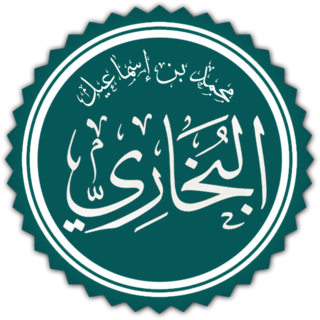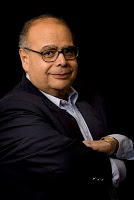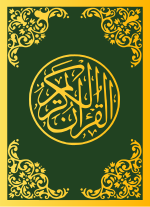
Names of God in Islam are names attributed to God in Islam by Muslims. While some names are only in the Quran, and others are only in the hadith, there are some names which appear in both.

The Hejaz is a region in the west of Saudi Arabia. It includes the cities of Mecca, Medina, Jeddah, Tabuk, Yanbu and Taif. It is also known as the "Western Province" in Saudi Arabia. It is bordered in the west by the Red Sea, in the north by Jordan, in the east by the Najd, and in the south by the 'Asir Region. Its largest city is Jeddah, the second largest city in Saudi Arabia, with Mecca and Medina being the fourth and fifth largest cities respectively in the country. The Hejaz is the most cosmopolitan region in the Arabian Peninsula.

Hafiz, literally meaning "memorizer", depending on the context, is a term used by Muslims for someone who has completely memorized the Quran. Hafiza is the female equivalent.

Muḥammad ibn Ismā‘īl al-Bukhārī, commonly referred to as Imam al-Bukhari or Imam Bukhari, was a Persian Islamic scholar who was born in Bukhara. He compiled the hadith collection known as Sahih al-Bukhari, regarded by Sunni Muslims as the most authentic (sahih) hadith collections. He also wrote other books such as Al-Adab al-Mufrad.
{{Infobox religious biography | era = Islamic Golden Age | image = Ahmad_bin_Hanbal_Name.png | caption = Aḥmad bin Ḥanbal's name in Arabic calligraphy | name = Abū ʿAbdillāh Aḥmad Ibn Muḥammad Ibn Ḥanbal al-Dhuhli
أَبُو عَبْد ٱلله أَحْمَد بْن مُحَمَّد بْن حَنْبَل الذهلي | title = Shaykh al-Islām, Imam | religion = Islam | birth_date = November 780 CE
Rabi-ul-Awwal 164 AH
Baghdad, Abbasid Caliphate | death_date = 2 August 855 CE
12 Rabi-ul-Awwal 241 AH
Baghdad, Abbasid Caliphate | region = Iraq | jurisprudence = Ijtihād | creed = Atharī | main_interests = Fiqh, Ḥadīth, Aqeedah | occupation = Scholar of Islam, muhaddith | notable_ideas = [[Ḥanbalī |Ḥanbalī Maḏhab | works = Musnad Ahmad ibn Hanbal
Radd ʿala’l-Ḏj̲ahmiyya wa’l-Zanādiḳa
Kitāb al-Sunnah | influences = Al-Shafi‘i, Sufyan ibn `Uyaynah, ‘Abd ar-Razzaq as-San‘ani | influenced = Particularly jurists and mystics of the Hanbali school like Abu Dawood, ʻAbd Allāh ibn Aḥmad Ibn Ḥanbal, Harb ibn Ismail al-Kirmani, Al-Qadi Abu Ya'la, Ibn Aqil, Abdul-Qadir Gilani, Ibn al-Jawzi, Ibn Qudamah, Ibn Hamdan, Ibn Taymiyyah, Abdullah Ansari, Ibn Qayyim al-Jawziyyah, Ibn Rajab, Ibn Muflih, Mar'i al-Karmi, Sulayman ibn 'Abd al-Wahhab, Muhammad ibn Abd al-Wahhab, Asad al Hanbali, Badr al Deen al Hanbali }}

Nasr Hamid Abu Zayd was an Egyptian Quranic thinker, author, academic and one of the leading liberal theologians in Islam. He is famous for his project of a humanistic Quranic hermeneutics, which "challenged mainstream views" on the Quran, sparking "controversy and debate." While not denying that the Quran was of divine origin, Zayd argued that it was a "cultural product" that had to be read in the context of the language and culture of seventh century Arabs, and could be interpreted in more than one way. He also criticized the use of religion to exert political power. In 1995 an Egyptian Sharia court declared him an apostate, this led to threats of death and his fleeing Egypt several weeks later. He later quietly returned to Egypt where he died.

A Qari is a person who recites the Quran with the proper rules of recitation (tajwid).

Taha Hussein was one of the most influential 20th-century Egyptian writers and intellectuals, and a figurehead for the Egyptian Renaissance and the modernist movement in the Middle East and North Africa. His sobriquet was "The Dean of Arabic Literature" . He was nominated for a Nobel Prize in literature fourteen times. He was pharaonism most notable advocate

Abdul Rahman Ibn Abdul Aziz al-Sudais, better known as Al-Sudais, is one of the nine imams of the Grand Mosque Masjid al-Haram in Makkah, Saudi Arabia; the president of the General Presidency for the Affairs of the Two Holy Mosques; a renowned Qāriʾ ; and was the Dubai International Holy Qur'an Award's "Islamic Personality Of the Year" in 2005.

History of the Quran is the timeline and origin of the written compilations or manuscripts of the holy book of Islam, based on historical findings. It spans several centuries, and forms an important major part of the early history of Islam.

‘Abdul-Basit ‘Abdus-Samad, or Abdel Basit Abdel Samad, or Abdul Basit Muhammad Abdus Samad was an Egyptian Quran reciter and is regarded as one of the best reciters of the Quran who ever lived. He had won three world Qira'at competitions in the early 1970s. ‘Abdus-Samad was one of the first huffaz to make commercial recordings of his recitations, and the first president of the Reciters' Union in Egypt. At 10, Abdul Basit finished learning the entire Quran by heart in his village. He also learned 7 styles of Quran recitation by the age of 12 and the 10 styles by 14. The quadrumvirate of El Minshawy, Abdul Basit, Mustafa Ismail, and Al-Hussary, who belong to the famous and well-respected "Egyptian Reciting School", are generally considered the most important and famous Qurra' of modern times to have had an outsized impact on the Islamic world. He came to be called the Golden Throat and the Voice of Heaven due to his melodious style, remarkable breath control, and unique emotional and engaging tone. He has a son, Tareq Abd El Basit Abd El Samad, who is also a known sheikh in Egypt; he has done many interviews on his father's life, family and career.

Tanzil "sending down", Inzal "bringing down", and nuzul "descending", and other words based on the triconsonantal Arabic root verb nazala "to descend", refer to the Islamic belief in the descent of God's message from heaven to earth where it was revealed to the Prophet of Islam, Muhammad.

Zaghloul El Naggar is an Egyptian geologist, Muslim scholar, and author. The main theme of El-Naggar's books has been science in Quran; his philosophy of science is blended with religion. He left his academic career to become the Chairman of Committee of Scientific Notions in the Qur'an, Supreme Council of Islamic Affairs, Cairo, Egypt.

Mahmoud Khalil al-Hussary, also known as Al-Hussary, was an Egyptian Qari widely acclaimed for his accurate recitation of the Qur'an. Al-Hussary committed the entire Qur'an to memory by age 8 and started reciting at public gatherings by age 12. In 1944, Al-Hussary won Egypt Radio's Qu'ran Recitation competition which had around 200 participants, including veterans like Muhammad Rifat. The quadrumvirate of El Minshawy, Abdul Basit, Mustafa Ismail, and Al-Hussary, who belong to the famous and well-respected "Egyptian Reciting School", are generally considered the most important and famous Qurra' of modern times to have had an outsized impact on the Islamic world.

Ibn Ḥajar al-ʿAsqalānī or Ibn Ḥajar, was a classic Islamic scholar and polymath "whose life work constitutes the final summation of the science of Hadith." He authored some 150 works on hadith, history, biography, tafsir, poetry, and Shafi'i jurisprudence, the most valued of which being his commentary of Sahih al-Bukhari, titled Fath al-Bari.
Muḥammad Fu'ād ʿAbd al-Baqī was a prolific Egyptian scholar of Islam, a poet and a translator from French and English. He authored and compiled many books related to the Qur'an and the sunnah, including indices which give the reader access to the hadith of the prophet Muhammad.

Jalal al-Din al-Suyuti, or Al-Suyuti, was an Egyptian polymath, Islamic scholar, historian, Sufi, and jurist. From a family of Persian origin, he was described as one of the most prolific writers of the Middle Ages. His biographical dictionary Bughyat al-Wuʻāh fī Ṭabaqāt al-Lughawīyīn wa-al-Nuḥāh contains valuable accounts of prominent figures in the early development of Arabic philology. He was appointed to a chair in the mosque of Baybars in Cairo in 1486, and was an authority of the Shafi'i school of thought (madhhab).

Abu Muhammad Izz al-Din Abdul Aziz bin Abd al-Salam bin Abi al-Qasim bin Hassan al-Salami al-Shafi’i, also known by his titles, Sultan al-'Ulama/ Sulthanul Ulama, Abu Muhammad al-Sulami, was a famous mujtahid, Ash'ari theologian, jurist and the leading Shafi'i authority of his generation. He was described by Al-Dhahabi as someone who attained the rank of ijtihad, with asceticism and piety and the command of virtue and forbidding of what is evil and solidity in religion. He was described by Ibn al-Imad al-Hanbali as the sheikh of Islam, the imam of the scholar, the lone of his era, the authority of scholars, who excelled in jurisprudence, origins and the Arabic language, and reached the rank of ijtihad, and received students who traveled to him from all over the country.

Shahzada Husain Burhanuddin, also known as Husain Mufaddal Saifuddin, is the third and youngest son of Mufaddal Saifuddin, the current incumbent of the office of the 53rd Da'i al-Mutlaq. He is a Qāriʾ and an honorary member of Naqabāt Qurrāʾ al-Quran in Cairo. Burhanuddin is a provost of Aljamea-tus-Saifiyah and heads Mahad al-Zahra, through which he has been instrumental in the realization of his grand father Mohammed Burhanuddin's vision for Dawoodi Bohra community to seek enlightenment through Quranic values. He also administers a number of socio-economic institutions run by Dawoodi Bohra community. Burhanuddin is a recipient of All India Council for Human Rights' Ambassador for Peace Award.















